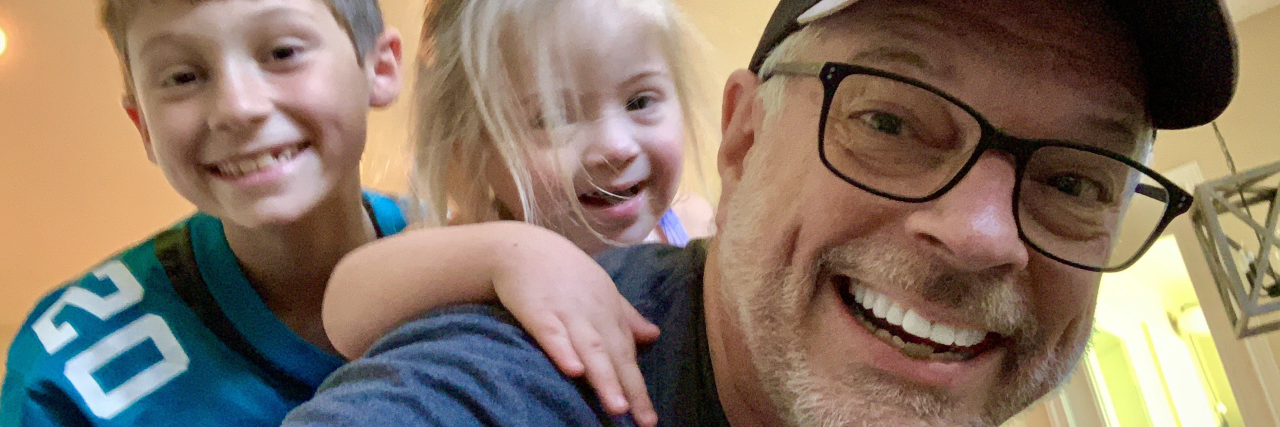Sharing an orbit with a child with Down syndrome has more than its share of magic moments, those instances where the clouds part and what’s really important reveals itself. When they happen, you can’t help but stop and think about how lucky you are to have her in your life.
On Mondays and Wednesdays, I take my granddaughter to therapy before dropping her off at preschool. She is an active, inquisitive 3-year-old who enjoys the little things in the world around her with an enthusiasm I wish everybody had.
Here’s a typical day:
I pick her up about a half hour before therapy starts, helping her mother with the toothbrush, the hairbrush and gently containing Juliette’s desire to laugh and play, rather than focus on getting pretty. She opens the back door and holds my hand as we navigate the one step down to the driveway. Sometimes she will bolt for the refrigerator or Daddy’s tool box to explore the treasures there, so I try to account for that flexibility.
When the song is over, she becomes a Disney Tour Guide, pointing out the scenery as if she were leading the Jungle Cruise. Her words are still pretty much monosyllabic but increasingly she strings some together, eliciting excited praise from Grandpa. On occasion, she stuns me with a perfect sentence, a clue to what that amazing brain may yet be capable of.
When we get out of the car, we have our rituals. We stand under the steeple-like architecture of the entryway and shout “hello” to hear it echo back at us. She presses the button to unlock the door to the lobby, greets the women behind the counter and makes a beeline for the book box. There are usually a few minutes for her to read something to me, often backwards or upside down, just to show how unimportant many of our conventions are.
When the therapist arrives, she waves “bye” and tramps behind her teacher for an hour of early intervention.
When the session is over and they return, I ask her to describe her experience. Juliette will say a word or two as the therapist briefs me on what I can do to support her work.
Then it’s off to preschool. We mainstream her there and that has had a huge impact on her development. She potty-trained herself when she saw the other kids doing it and is a little organizer in class, using hand signals and “yes” and “no” to lead her troops.
Three-year-olds are still wide open and loving. They surround me, the only grown-up male in the room, all talking at once.
I hate to leave.
But in the midst of the daily drill, moments of magic often occur. Today was one of those moments.
Juliette returned from her therapy session with two other children — a 5-year-old boy who seemed like an escort and a beautiful 11-year-old girl who also is blessed with Down syndrome.
The 11-year-old explained to me that Juliette “usually walks slow.” I know she likes to inspect every treasure along the hallways. But today, she marched right alongside her two friends. “She stayed with me today,” her older role model said with a smile. Juliette nodded enthusiastically.
“She does that a lot, too,” her older companion observed.
I pondered this magical trio. I know the clients ebb and flow and it may well have been the first time these three had been together. But you would have thought they were lifelong friends.
When I asked Juliette if she was ready to go, she turned to her friends and gave them each a huge hug. She only got up to the belt line of the 11-year-old but was able to hug the boy just like she sees her parents do, gently and authentically, almost bracketing the intensity based on how her partner was willing to accept the affection.
“High five?” the 11-year-old asked.
Juliette obliged them both.
“Bye Jules!” they both said as she turned toward the door.
When we get to the car after therapy, I record a brief video with Jules to send to her mom and dad. I had a hard time getting through this one. The sheer unconditional love and unrestrained elation that radiated among that trio melted my heart.
I thought about all of the horrific tragedy in our world and how so much of it is connected to exclusivity and disenfranchisement. These are concepts these kids don’t understand. Differences are just differences, nothing more than pointing out the primary colors of puzzle pieces Juliette has learned to carefully combine into a complete picture, smiling and pointing when it comes together.
The tool kits we are given at birth may be populated differently. But the fundamental commonalities we share as human beings far outweigh the things some may try to use to separate us.
I knelt down to kiss Juliette goodbye, the last of the rituals before leaving her in the hands of the preschool team. She pecked me. I made the “I Love You” gesture. She did too, and so did a couple of her classmates.
Juliette turned and walked confidently in the direction of the action. The class was getting ready to go out to the playground. My usefulness was over for the moment, and she was ready to engage in whatever adventures the day had to offer.
We all come with “special needs.” Some have more visible needs than others. I believe the miracle superpower which lives in that extra chromosome is the ability to recognize and accept everyone for who they are, to include them in your circle of discovery and love them without condition.
I sat in the car and wiped away the tears my masculinity had been effectively hiding as I felt gratitude to be able to watch this wonderful girl living her life with delight and enthusiasm. And I realized that it was Juliette who was the teacher. And I was the student.

